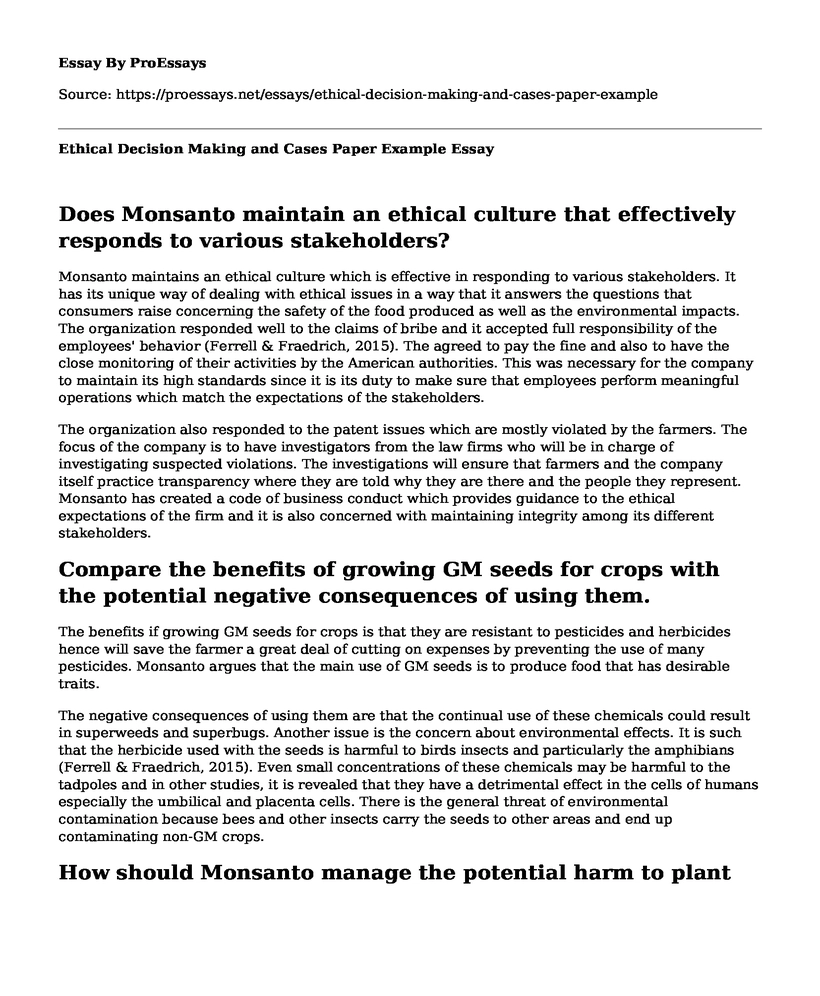Does Monsanto maintain an ethical culture that effectively responds to various stakeholders?
Monsanto maintains an ethical culture which is effective in responding to various stakeholders. It has its unique way of dealing with ethical issues in a way that it answers the questions that consumers raise concerning the safety of the food produced as well as the environmental impacts. The organization responded well to the claims of bribe and it accepted full responsibility of the employees' behavior (Ferrell & Fraedrich, 2015). The agreed to pay the fine and also to have the close monitoring of their activities by the American authorities. This was necessary for the company to maintain its high standards since it is its duty to make sure that employees perform meaningful operations which match the expectations of the stakeholders.
The organization also responded to the patent issues which are mostly violated by the farmers. The focus of the company is to have investigators from the law firms who will be in charge of investigating suspected violations. The investigations will ensure that farmers and the company itself practice transparency where they are told why they are there and the people they represent. Monsanto has created a code of business conduct which provides guidance to the ethical expectations of the firm and it is also concerned with maintaining integrity among its different stakeholders.
Compare the benefits of growing GM seeds for crops with the potential negative consequences of using them.
The benefits if growing GM seeds for crops is that they are resistant to pesticides and herbicides hence will save the farmer a great deal of cutting on expenses by preventing the use of many pesticides. Monsanto argues that the main use of GM seeds is to produce food that has desirable traits.
The negative consequences of using them are that the continual use of these chemicals could result in superweeds and superbugs. Another issue is the concern about environmental effects. It is such that the herbicide used with the seeds is harmful to birds insects and particularly the amphibians (Ferrell & Fraedrich, 2015). Even small concentrations of these chemicals may be harmful to the tadpoles and in other studies, it is revealed that they have a detrimental effect in the cells of humans especially the umbilical and placenta cells. There is the general threat of environmental contamination because bees and other insects carry the seeds to other areas and end up contaminating non-GM crops.
How should Monsanto manage the potential harm to plant and animal life from using products such as Roundup?
Farmers need to prevent resistance to the Roundup herbicide. They are required to vary herbicide use and practice crop rotations. Roundup is easy to use especially with the conjunction with Roundup ready seeds as the farmers do not take the time to institute these preventive measures (Ferrell & Fraedrich, 2015). When there is no rotation of crops, these farmers will rotate one roundup ready crop with another. In this case, the agricultural pests such as rootworm become resistant to genes that are intended to kill them. In this way, there will be no concentration of chemicals that will cause harm to the cells of humans or to amphibians. Roundup is dangerous and farmers need to be aware of what they are growing as well as GM foods which are said to contain so much of the chemicals.
References
Ferrell, O. C., & Fraedrich, J. (2015). Business ethics: Ethical decision making & cases. Nelson Education.
Cite this page
Ethical Decision Making and Cases Paper Example. (2022, Dec 26). Retrieved from https://proessays.net/essays/ethical-decision-making-and-cases-paper-example
If you are the original author of this essay and no longer wish to have it published on the ProEssays website, please click below to request its removal:
- Responses to Qestions on Euthanasia
- Horse Boarding Farm Business Essay
- Information Security Management Assignment Paper Example
- Ethical Considerations and Possible Research Questions for the CEOs and Employees
- Implementation Used by Macville Expresso Machine Manufacturing Company Paper Example
- Essay Example on Ethical Conduct in Business: Creating a Successful Environment
- Essay Example on Poorly Articulated Goals/Objectives: Impact on Public Health Programs







